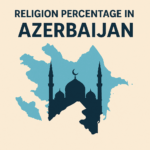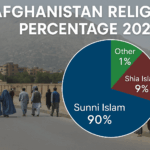Azerbaijan is often viewed as a Muslim-majority nation. But there’s a deeper layer to its religious makeup. Christianity, while a minority religion today, has roots that stretch back nearly two millennia. This article explores the Christian population in Azerbaijan, its historical journey, and the challenges Christians face in 2025.
Quick Snapshot: Christianity in Azerbaijan (2025)
- Estimated Christian Population: ~3% of total
- Major Christian Groups: Russian Orthodox, Armenian Apostolic, Roman Catholic, and Evangelical denominations
- Religious Freedom Status: Constitutionally protected, but often monitored
- Main Regions with Christian Communities: Baku, Ganja, northern regions, and areas with ethnic Armenians and Russians
A Brief History of Christianity in Azerbaijan
Christianity arrived in the region long before Islam. It dates back to the 1st century AD when missionaries passed through the Caucasus. By the 4th century, the Caucasian Albanian Church was already well-established, becoming one of the oldest Christian communities in the region.
Over time, various Christian denominations took root:
- Armenian Apostolic Church – Especially influential in the Nagorno-Karabakh region.
- Russian Orthodox Church – Gained prominence during the Russian Empire and Soviet periods.
- Roman Catholic Church – A much smaller but active presence.
- Protestant & Evangelical Groups – Growing in the post-Soviet era.
During Soviet rule, Christian worship was heavily suppressed, with churches closed or repurposed. After Azerbaijan gained independence in 1991, some freedoms were restored. But the Christian community has never regained its pre-Soviet size or influence.
Christian Population in Azerbaijan (2025)
In 2025, Christians make up about 2–3% of Azerbaijan’s nearly 10 million residents. The majority of these are:
- Russian Orthodox Christians – Many are ethnic Russians or Slavs residing in urban areas.
- Armenian Apostolic Christians – Mainly found in areas bordering Armenia or formerly in Nagorno-Karabakh.
- Catholics & Evangelicals – Small but persistent communities, mostly in Baku and surrounding cities.
Regional Presence
- Baku – The capital has the largest Christian population due to diversity and expatriates.
- Ganja & Sumgait – Smaller Christian communities exist here.
- Northern Azerbaijan – Home to Udi people, considered descendants of Caucasian Albanians and some of the oldest Christians in the country.
Is Azerbaijan a Christian Country?
No. Azerbaijan is a secular nation with a Muslim majority. About 96% of its population identifies as Muslim, mostly Shia (roughly 85%) and Sunni (about 15%).
That said, Azerbaijan’s constitution grants freedom of religion. Christianity, Judaism, and other minority faiths are legally recognized. However, in practice, religious minorities—including Christians—face restrictions.
Christian Persecution in Azerbaijan
While Azerbaijan promotes religious tolerance on paper, reports suggest restrictions on Christian activities still exist.
Common challenges include:
- Registration Requirements: Churches must register with the government to operate legally.
- Surveillance: Christian gatherings, especially among Evangelical or missionary groups, are monitored.
- Restrictions on Evangelism: Proselytizing is discouraged and sometimes penalized.
- Harassment: Some converts from Islam to Christianity report social ostracization and pressure from family or local authorities.
There is no state-sponsored violent persecution, but freedom is limited, especially for non-traditional Christian groups.
Christian Genocide and Historical Tensions
Although genocide is a strong term and not commonly associated with Azerbaijan’s Christian history, the Armenian-Azerbaijani conflict has complicated religious relations.
The war over Nagorno-Karabakh, a region largely populated by Christian Armenians, has led to:
- Displacement of Armenian Christians
- Destruction or repurposing of churches
- Tensions between communities based on both ethnicity and religion
It’s important to separate ethnic conflict from religious persecution, but the two are often intertwined in public discourse.
Growth and Missionary Efforts
Despite the limitations, some Christian groups are growing:
- Evangelical house churches have formed in recent years.
- Catholic missions continue humanitarian and religious outreach.
- The Alov Christian Network and others attempt to reach Azeris with Christian literature and digital content.
The younger generation is increasingly curious about other belief systems, especially in urban areas. Still, public conversions remain rare due to social and legal pressures.
Is Christianity Growing in Azerbaijan?
Growth is slow but steady—primarily in underground or low-visibility formats.
Signs of growth:
- Increased interest in Christianity among youth (via online platforms)
- House church networks developing cautiously
- More interfaith dialogue in academic and civil spaces
Yet, the state still watches Christian organizations closely. So growth is cautious and often quiet.
FAQs
What percentage of Azerbaijan is Christian in 2025?
Roughly 2% to 3% of the population. Most are Russian Orthodox or Armenian Apostolic.
Is it safe to be Christian in Azerbaijan?
Yes, but with restrictions. Public worship and evangelism are limited. Minority churches must register and comply with laws.
Are there Christian missionaries in Azerbaijan?
Yes, but they often operate discreetly due to surveillance and laws restricting religious activity.
Has Azerbaijan ever been a Christian country?
Parts of it were Christian long before Islam arrived. The Caucasian Albanian Church was dominant until the Islamic conquests.
What about Christian persecution in Azerbaijan?
There’s no violent persecution, but religious freedom is limited. House churches and unregistered Christian groups face difficulties.
Final Thoughts: The Future of Christianity in Azerbaijan
Christianity may not be the dominant faith in Azerbaijan, but it holds an important place in its history and society. As the country evolves, religious minorities—including Christians—are slowly carving out spaces for faith and dialogue.
The road isn’t easy. But for many believers, the quiet persistence of their faith is a powerful statement of resilience.

